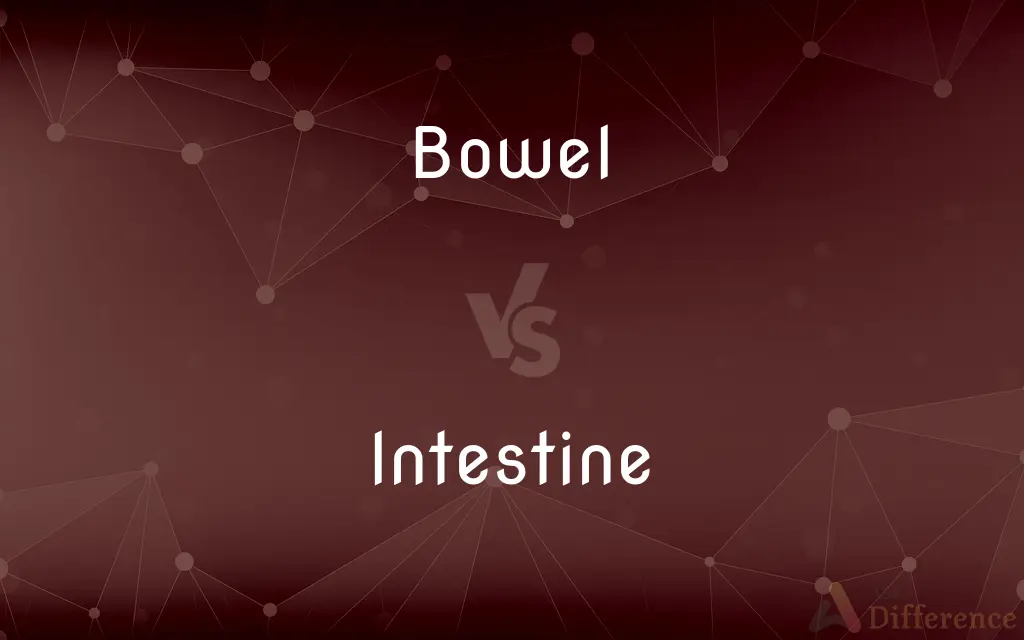Bowel vs. Intestine — What's the Difference?
By Fiza Rafique & Urooj Arif — Updated on March 10, 2024
The bowel is a general term for the lower parts of the digestive system, including the small and large intestines, whereas "intestine" specifically refers to the tubular part of the digestive tract.

Difference Between Bowel and Intestine
Table of Contents
ADVERTISEMENT
Key Differences
The term "bowel" encompasses the entirety of the lower gastrointestinal tract, including both the small and large intestines, playing a crucial role in digestion and waste removal. On the other hand, the "intestine" refers more specifically to the long, tube-like structures—the small and large intestines—where nutrient absorption and waste processing occur.
Bowel movements, a common phrase, relate to the excretion process involving the bowels, highlighting their role in waste elimination. Conversely, when discussing the intestine, the focus is often on the digestion and absorption phases, where nutrients from food are absorbed into the body.
The health issues associated with the bowel can include a wide range of disorders affecting any part of the lower digestive tract, such as irritable bowel syndrome (IBS) and inflammatory bowel disease (IBD). In contrast, intestinal issues might specifically refer to conditions like blockages, infections, or diseases directly impacting the small or large intestines.
In medical contexts, "bowel" is used in a broader sense, potentially encompassing discussions about bowel cancer, which can affect any part of the lower digestive tract. The term "intestinal," however, would be used when referring to conditions or treatments specifically targeting the small or large intestines, like intestinal surgery.
The terminology used can also reflect the severity or nature of a condition; for example, "bowel obstruction" implies a serious, potentially life-threatening condition affecting the flow through the bowels, while "intestinal flora" refers to the beneficial bacteria within the intestines that aid in digestion and health.
ADVERTISEMENT
Comparison Chart
Scope
Encompasses the entire lower GI tract
Specifically the tubular parts of the GI tract
Focus
Often associated with the elimination process
Primarily involved in digestion and nutrient absorption
Health Issues
Broader range of disorders, including IBS and IBD
Specific conditions like blockages or infections
Medical Context
Used more generally, can include various parts of the GI tract
Used more specifically for conditions of the small or large intestines
Associated Terms
Bowel movements, bowel cancer
Intestinal flora, intestinal surgery
Compare with Definitions
Bowel
Can be affected by a wide range of disorders, including IBS and IBD.
She was diagnosed with an inflammatory bowel disease that affected her daily life.
Intestine
Divided into two main parts: the small and large intestines.
The large intestine absorbs water and forms stool.
Bowel
Associated with the process of excretion and waste removal.
Regular bowel movements are important for detoxification.
Intestine
Subject to specific medical conditions like blockages or infections.
An intestinal blockage required immediate surgery.
Bowel
Often used in the context of overall digestive health and function.
Probiotics are beneficial for maintaining healthy bowel function.
Intestine
The long, tube-like part of the digestive system where digestion and absorption occur.
The small intestine is key in absorbing nutrients from food.
Bowel
A term encompassing the lower parts of the digestive system, especially the intestines.
The doctor explained that a healthy diet is crucial for bowel health.
Intestine
Home to a complex microbiome essential for digestion and health.
The intestinal flora plays a crucial role in breaking down food.
Bowel
The focus of various medical examinations, such as colonoscopies.
The colonoscopy examined his bowels for any signs of cancer.
Intestine
The focus of surgeries and treatments for digestive diseases.
Intestinal surgery was necessary to remove the diseased section.
Bowel
Often bowels The intestine.
Intestine
The portion of the digestive tract extending from the stomach to the anus and, in humans and other mammals, consisting of two segments, the small intestine and the large intestine.
Bowel
A part or division of the intestine
The large bowel.
Intestine
Internal; civil:the intestine affairs of the nation.
Bowel
Bowels The interior of something
In the bowels of the ship.
Intestine
The alimentary canal of an animal through which food passes after having passed all stomachs.
Bowel
Bowels(Archaic) The seat of pity or the gentler emotions.
Intestine
One of certain subdivisions of this part of the alimentary canal, such as the small or large intestine in human beings.
Bowel
A part or division of the intestines, usually the large intestine.
Intestine
Domestic; taking place within a given country or region.
Bowel
(in the plural) The entrails or intestines; the internal organs of the stomach.
Intestine
(obsolete) Internal.
Bowel
The (deep) interior of something.
The treasures were stored in the bowels of the ship.
Intestine
Depending upon the internal constitution of a body or entity; subjective.
Bowel
The seat of pity or the gentler emotions; pity or mercy.
Intestine
Shut up; enclosed.
Bowel
Offspring
Intestine
Internal; inward; - opposed to external.
Epilepsies, fierce catarrhs,Intestine stone and ulcers.
Bowel
To disembowel.
Intestine
Internal with regard to a state or country; domestic; not foreign; - applied usually to that which is evil; as, intestine disorders, calamities, etc.
Hoping here to endIntestine war in heaven, the arch foe subdued.
An intestine struggle . . . between authority and liberty.
Bowel
One of the intestines of an animal; an entrail, especially of man; a gut; - generally used in the plural.
He burst asunder in the midst, and all his bowels gushed out.
Intestine
Depending upon the internal constitution of a body or entity; subjective.
Everything labors under an intestine necessity.
Bowel
Hence, figuratively: The interior part of anything; as, the bowels of the earth.
His soldiers . . . cried out amain,And rushed into the bowels of the battle.
Intestine
Shut up; inclosed.
Bowel
Offspring.
Intestine
That part of the alimentary canal between the stomach and the anus. See Illust. of Digestive apparatus.
Bowel
To take out the bowels of; to eviscerate; to disembowel.
Intestine
The bowels; entrails; viscera.
Bowel
The part of the alimentary canal between the stomach and the anus
Intestine
The part of the alimentary canal between the stomach and the anus
Common Curiosities
How long is the human intestine?
The human intestine is about 25 feet long, divided into the small and large intestines.
Is there a difference between bowel surgery and intestinal surgery?
Bowel surgery is a broader term, potentially including any part of the lower GI tract, while intestinal surgery specifically targets the small or large intestines.
Can bowel problems affect overall health?
Yes, bowel problems can significantly impact overall health, including nutrient absorption and waste removal.
Can bowel movements indicate health issues?
Changes in bowel movements can be an indicator of various health issues.
What causes bowel inflammation?
Bowel inflammation can be caused by autoimmune disorders, infections, or chronic diseases like Crohn's disease.
How does the large intestine function differently from the small intestine?
The large intestine primarily absorbs water and electrolytes, forming and storing feces, unlike the small intestine, which focuses on nutrient absorption.
What is the main function of the bowel?
The bowel's main function is digestion, nutrient absorption, and waste elimination.
How can one maintain a healthy bowel?
A healthy diet, regular exercise, and adequate hydration are key to maintaining bowel health.
What is the role of the small intestine?
The small intestine's primary role is the digestion of food and absorption of nutrients.
What is the significance of intestinal flora?
Intestinal flora, or gut microbiota, is crucial for digestion, vitamin production, and immune system function.
What are common signs of intestinal issues?
Common signs include abdominal pain, bloating, constipation, and diarrhea.
How are bowel disorders diagnosed?
Bowel disorders are diagnosed through a combination of medical history, physical examinations, and diagnostic tests like colonoscopies.
Can lifestyle changes improve intestinal health?
Yes, lifestyle changes like diet, exercise, and stress management can improve intestinal health.
What dietary factors can affect intestinal health?
High-fiber diets, probiotics, and adequate hydration positively affect intestinal health, while processed foods and excessive alcohol can be detrimental.
Are bowel and intestinal health related to other body systems?
Yes, the health of the bowel and intestines is closely linked to the immune system, mental health, and overall well-being.
Share Your Discovery

Previous Comparison
Nymphomaniac vs. Nymph
Next Comparison
Nighttime vs. NightAuthor Spotlight
Written by
Fiza RafiqueFiza Rafique is a skilled content writer at AskDifference.com, where she meticulously refines and enhances written pieces. Drawing from her vast editorial expertise, Fiza ensures clarity, accuracy, and precision in every article. Passionate about language, she continually seeks to elevate the quality of content for readers worldwide.
Co-written by
Urooj ArifUrooj is a skilled content writer at Ask Difference, known for her exceptional ability to simplify complex topics into engaging and informative content. With a passion for research and a flair for clear, concise writing, she consistently delivers articles that resonate with our diverse audience.
















































